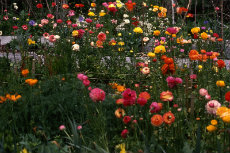
 Ever wonder how florists get their flowers to last so long? Here’s a few tips that will help you to keep your cut flowers longer. Pick fresh young blooms just as they open whenever possible. The ideal here is to pick blossoms freshened with morning dew; next best is early evening.
Ever wonder how florists get their flowers to last so long? Here’s a few tips that will help you to keep your cut flowers longer. Pick fresh young blooms just as they open whenever possible. The ideal here is to pick blossoms freshened with morning dew; next best is early evening.But this ideal time to pick is highly dependent on the day. The idea is to cut blooms with the highest levels of moisture and water-borne minerals retained in the stems. For this reason commercial growers will sometimes liquid feed a crop the day before harvesting the cut flowers.
Once cut remove most if not all foliage because the leaves will evaporate stem moisture into the air bleeding the bloom to an early death. The way you cut the stems has a lot to do with how long your prize blooms will last, too.
As a general rule firm, thick, fleshy stems like lily, gladioli, daffodil, anemone, tulip, snapdragon, polyanthus, etc. should be cut on a slant to allow maximum water to enter the stem.
Recut these stems frequently taking off a few centimeters each time to keep the water and food flowing up the stem and feeding the next buds to open.
Hardwood stems like viburnum, lilac, hydrangea, spirea, philadelphus(mock orange), tree peony, roses, spring fruit tree blossom, etc. should have the bottom 3-5cm scraped and/or crushed then plunged in 4-5cm of near boiling water for a few minutes. This seals the stems, locking in the stem minerals that the flower will live on for the remainder of its life.
Some flowers have a milky sap that is a true latex, sort of a raw rubber. This sap bleeds out quickly in water and, the flower quickly perishes. To stop this, burn or scald the stem ends immediately on picking. Re-scald if the stems are recut. Flowers with latex sap include: poinsettia, oleander, euphorbia, mandevilla and poppies.
Other flowers that respond well to their stem ends being boiled or scalded for a few minutes to seal in minerals include: aquilegia, aster, canterbury bells, chrysanthemum, dahlia, delphinium, foxglove, gaillardia, iris, stock and zinnia.
Once the stems are properly cut and prepared, stand in deep water up to the neck of the flower for at least a few hours. You can further enhance the flowers life span by adding the tiniest pinch of soluble plant food or Chrysal to this water in which the flower arrangement actually stands.
The flowers will absorb this nutrient solution through the stem wall, further enriching the bloom and prolonging it’s life. A pinch of sugar or epsom salts is an old fashioned substitute.
Also try adding a tiny spot of bleach or disinfectant to kill water-borne bacteria that causes stem rot which will block stems making flowers wilt and die quickly. At first sign of stem rot recut the stems at least 3cm above the affected stem.
Once the flowers have been arranged, place them in a bright, well ventilated room where temperatures remain comfortable to cool. Avoid excessive heat or direct sunlight which will perish blooms prematurely.
It’s all worth the effort because well prepared and cared for blooms can often outlive their neighbours left in the garden to weather the elements!
MORE PICTURES click here...





